![The Killing Of Sister George [1968]](/pictures/1006121.jpg) The Killing Of Sister George | DVD | (08/04/2002)
from £24.93
| Saving you £-18.94 (N/A%)
| RRP
The Killing Of Sister George | DVD | (08/04/2002)
from £24.93
| Saving you £-18.94 (N/A%)
| RRP Sister George" within The Killing of Sister George is Britain's best-loved soap opera character, played by actress June Buckeridge (Beryl Reid). Buckeridge has become so identified with her character--a sweet old Miss Marple-ish nurse who putters around her quaint little village on a motor scooter--even her friends call her George. But outside the studio she's a hard-drinking, hot-tempered, foul-mouthed lesbian living with an immature young thing she's nicknamed "Childie" (Susannah York, who makes her memorable entrance in a sheer baby-doll nightie). At her worst Sister George is an abusive monster (in a moment of rage she forces Childie to eat the butt of her cigar) but beneath the bluster is an insecure television actress. When the studio decides to kill her character off and an executive makes a play for Childie, the soap star desperately clings to her young lover. Director Robert Aldrich, best known for his tough action films and gothic thrillers, brings his fierce vision of human nature to Frank Marcus's play . In its best moments the film simmers in angry suspicion and helpless frustration, brought to life by Reid's vivacious performance but other scenes are overlong and stage-bound and would have benefited greatly from judicious trimming and tightening. The caricatured portrayals of lesbian life have aged rather poorly--an inevitable sign of the times--but this acidic show-biz drama still carries a hefty emotional punch. --Sean Axmaker, Amazon.com
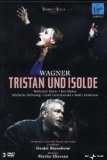 Wagner - Tristan Und Isolde (Barenboim) | DVD | (10/11/2008)
from £19.00
| Saving you £-3.75 (N/A%)
| RRP
Wagner - Tristan Und Isolde (Barenboim) | DVD | (10/11/2008)
from £19.00
| Saving you £-3.75 (N/A%)
| RRP Wagner: Tristan And Isolde / Daniel Barenboim (3 Discs)
![Strauss: Elektra Special Edition [Iréne Theorin, Waltraud Meier, Eva-Maria Westbroak] [Blu-ray] [2014]](/pictures/1133574.jpg) Strauss: Elektra Special Edition | Blu Ray | (19/05/2014)
from £9.43
| Saving you £-0.44 (N/A%)
| RRP
Strauss: Elektra Special Edition | Blu Ray | (19/05/2014)
from £9.43
| Saving you £-0.44 (N/A%)
| RRP ARTH 108110; ARTHAUS MUSIK - Germania; Classica Lirica
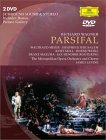 Wagner: Parsifal | DVD | (14/10/2002)
from £22.98
| Saving you £-0.99 (N/A%)
| RRP
Wagner: Parsifal | DVD | (14/10/2002)
from £22.98
| Saving you £-0.99 (N/A%)
| RRP A performance of Wagner's opera 'Parsifal' featuring the Metropolitan Opera Orchestra and Chorus. Conducted by James Levine. The action takes place in the Middle Ages. At the castle of Monsalvat cut off from the rest of the world the brotherhood of Grail Knights guards the chalice in which the blood of the crucified Saviour had once been caught. In an effort to seize possession of the Grail Klingsor a powerful magician has established his realm at the foot of the mountain peop
![The Quest [1996]](/pictures/1003170.jpg) The Quest | DVD | (01/06/2009)
from £20.00
| Saving you £-10.01 (N/A%)
| RRP
The Quest | DVD | (01/06/2009)
from £20.00
| Saving you £-10.01 (N/A%)
| RRP Jean-Claude Van Damme directs and stars in this exciting fast moving action packed film which centres around Chris Dubois (Van-Damme) and the Ghan-Gheng a legendary 'special invite only' tournament that brings together the greatest fighters of the world in a winner takes all test of skill and courage. When Debois learns of the prestiegous tournament and the prize of a solid gold statue of a dragon he calls on his ""old friend"" Dobbs (Roger Moore) to help him enter the covena
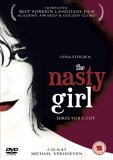 The Nasty Girl | DVD | (07/02/2005)
from £N/A
| Saving you £N/A (N/A%)
| RRP
The Nasty Girl | DVD | (07/02/2005)
from £N/A
| Saving you £N/A (N/A%)
| RRP The award winning true story of a popular young girl in a small German town who entered a school essay during the 1970's writing on what her town did during World War II. What she finds to her surprise and dismay is that the Catholic clergy and businessmen who she was raised to respect and admire and who she fervently believed defied the Nazi's did just the opposite. And after deciding to write the book on the subject the more she digs the more she is thwarted and actually thre
![Wagner: Tannhauser [1995]](/pictures/1028750.jpg) Wagner: Tannhauser | DVD | (28/09/2000)
from £N/A
| Saving you £N/A (N/A%)
| RRP
Wagner: Tannhauser | DVD | (28/09/2000)
from £N/A
| Saving you £N/A (N/A%)
| RRP In Richard Wagner's obsessive drama Tannhauser--with its themes of sin and repentance, cultural inhibition and artistic spontaneity, sexual excess and lost innocence--symbols sprout as profusely as dandelions on summer lawns. A lot of the symbols were put there by the composer (who also wrote the libretto), but for this production director David Alden has decided to add many more--notably in the first scene: an orgy in the love nest of the goddess Venus. The sadomasochistic visuals, reminiscent of the feverish inventions of Hieronymus Bosch, may help to explain Tannhauser's decision that he wants to go home. Like the scenery, the costumes are eclectic, ranging from modern formal evening gowns to medieval suits of armour and even, in a few choice instances, nothing at all. The director may be trying to say too many things at once. The profusion of visual symbols shows a rich imagination, but a more clearly defined focus would have been helpful. That kind of focus is found in the acting, partly because Alden is a good director but also because he is working with seasoned performers. René Kollo as Tannhauser and Bernd Weikl as Wolfram von Eschenbach have made specialties of these roles, and even when the story strains credibility or when the music strains their voices, they give convincing portrayals, as do Waltraud Meier and Nadine Secunde and the supporting cast. Zubin Mehta's conducting is opulent if not subtle. This is an intriguing though sometimes disturbing production. --Joe McLellan, Amazon.com
![Ich bin dein Mensch [Region 2]](/pictures/1162382.jpg) Ich bin dein Mensch | DVD | (23/09/2021)
from £14.13
| Saving you £N/A (N/A%)
| RRP
Ich bin dein Mensch | DVD | (23/09/2021)
from £14.13
| Saving you £N/A (N/A%)
| RRP ![Wagner: Tristan und Isolde [1976]](/pictures/1028804.jpg) Wagner: Tristan und Isolde | DVD | (15/05/2000)
from £23.15
| Saving you £6.84 (29.55%)
| RRP
Wagner: Tristan und Isolde | DVD | (15/05/2000)
from £23.15
| Saving you £6.84 (29.55%)
| RRP Waltraud Meier is the stuff of which great Isoldes are made--a passionate actress who sings her heart out at every point and yet somehow keeps something in reserve from the narration and curse of the first act for the love duet of the second and the "Liebestod" of the third. Her Tristan, Jon Fredric West, is more or less her equal--he is particularly impressive in the mad death agony of the third act; his Tristan is an ordinary hero who becomes something larger. Among the other principals, Kurt Moll's Mark stands out in its eloquent heart-break, not so much a cuckold as a man who wants everything to work out right; Weikl's Kurwenal and Lipovsek's Brangane are, credibly, ordinary people caught up in great tragedy. Mehta's account of the score is solid and professional--he gets nothing wrong and everything right in a performance which survives occasionally perversely innovative staging to touch greatness. On the DVD: The DVD includes subtitles in French, German, English and Dutch. --Roz Kaveney
![Verdi: Don Carlos [1996]](/pictures/1028739.jpg) Verdi: Don Carlos | DVD | (20/11/2000)
from £9.18
| Saving you £10.81 (117.76%)
| RRP
Verdi: Don Carlos | DVD | (20/11/2000)
from £9.18
| Saving you £10.81 (117.76%)
| RRP This is a 1996 all-star-cast version from Paris of the original French version of Verdi's epic five-act opera, Don Carlos. First produced in 1867, only Wagner would write musical drama on a grander scale, and due to the three-and-a-half-hour running time most subsequent productions have made substantial cuts. This is therefore a rare opportunity to witness Verdi's tragedy in its entirety.Set in the 16th century in the aftermath of war between Spain and France, Don Carlo (Roberto Alagna), the heir to the Spanish throne comes to France to meet with his beloved Elizabeth de Valois (Karita Mattila). Inevitably politics divide the lovers, and while Rodrigue (Thomas Hampson) falls in with Flemish rebels, the Inquisition is determined to be the power behind the peace. This is certainly not Verdi's greatest work, but it contains great music and the stars are allowed to shine with strong characterisations in an elegantly designed production. There are no gimmicks or attempts at spurious contemporary relevance here, simply singers of the calibre of Alagna, Mattila, Hampson, plus the outstanding Eric Halfvarson as the Grand Inquisitor. This is a production that continues in the 19th-century tradition, and in the process delivers the frisson of world-class opera. --Gary S. DalkinOn the DVD: While the running time precludes much in the way of special features, via DVD-ROM the libretto can be printed in French, together with an article and biographies. The picture is presented at approximately 1.7:1 and while far superior to video could still benefit from anamorphic enhancement. The sound is stereo or excellent Dolby Digital 5.0. The booklet offers a detailed synopsis in English, French, German, Italian and Spanish and there are subtitles in the same languages. The disc is encoded for regions two to six. --Gary S. Dalkin
![Wagner:Der Ring [Orchestra and Chorus of the Teatro alla Scala] [ARTHAUS: BLU RAY] [Blu-ray] [2015]](/pictures/1153314.jpg) Wagner:Der Ring | Blu Ray | (02/02/2015)
from £N/A
| Saving you £N/A (N/A%)
| RRP
Wagner:Der Ring | Blu Ray | (02/02/2015)
from £N/A
| Saving you £N/A (N/A%)
| RRP ![Wagner: Tannhauser (Live Recording From The Festspielhaus Baden-Baden 2008) [Blu-ray] [2009] [Region Free]](/pictures/1130614.jpg) Wagner: Tannhauser (Live Recording From The Festspielhaus Baden-Baden 2008) | Blu Ray | (28/09/2009)
from £N/A
| Saving you £N/A (N/A%)
| RRP
Wagner: Tannhauser (Live Recording From The Festspielhaus Baden-Baden 2008) | Blu Ray | (28/09/2009)
from £N/A
| Saving you £N/A (N/A%)
| RRP Tannhauser
![Wagner-Tristan and Isolde Bayreuth Festival [1995]](/pictures/1086561.jpg) Wagner-Tristan and Isolde Bayreuth Festival | DVD | (14/07/2008)
from £N/A
| Saving you £N/A (N/A%)
| RRP
Wagner-Tristan and Isolde Bayreuth Festival | DVD | (14/07/2008)
from £N/A
| Saving you £N/A (N/A%)
| RRP Wagner: Tristan And Isolde
![Strauss: Elektra (Aix en Provence/Patrice Chereau) [DVD] [2014] Digibook](/pictures/1157406.jpg) Strauss: Elektra (Aix en Provence/Patrice Chereau) | DVD | (26/05/2014)
from £N/A
| Saving you £N/A (N/A%)
| RRP
Strauss: Elektra (Aix en Provence/Patrice Chereau) | DVD | (26/05/2014)
from £N/A
| Saving you £N/A (N/A%)
| RRP ![Strauss: Elektra (Aix en Provence/Patrice Chereau) [Blu-ray] [2014] Digibook](/pictures/1152039.jpg) Strauss: Elektra (Aix en Provence/Patrice Chereau) | Blu Ray | (26/05/2014)
from £25.65
| Saving you £N/A (N/A%)
| RRP
Strauss: Elektra (Aix en Provence/Patrice Chereau) | Blu Ray | (26/05/2014)
from £25.65
| Saving you £N/A (N/A%)
| RRP 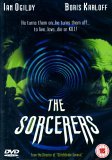 The Sorcerers | DVD | (06/12/2004)
from £9.98
| Saving you £-6.99 (N/A%)
| RRP
The Sorcerers | DVD | (06/12/2004)
from £9.98
| Saving you £-6.99 (N/A%)
| RRP The Sorcerers, the second film directed by the lost "wunderkind" of British cinema Michael Reeves, may not have the scope and visceral impact of his masterpiece, Witchfinder General (1968), but there's enough fierce originality here to show what a tragic loss it was when he died from a drugs overdose aged only 24. The film also shows the effective use he made of minimal resources, working here on a derisory budget of less than £50,000--of which £11,000 went to the film's sole "named" star, Boris Karloff. Karloff plays an elderly scientist living with his devoted wife in shabby poverty in London, dreaming of the brilliant breakthrough in hypnotic technique that will restore him to fame and fortune. Seeking a guinea-pig, he hits on Mike, a disaffected young man-about-town (Ian Ogilvy, who starred in all three of Reeves' films). But the technique has an unlooked-for side effect--not only can he and his wife make Mike do their bidding, they can vicariously experience everything that he feels. At which point, it turns out that the wife has urges and desires that her husband never suspected. Karloff, then almost at the end of his long career, brings a melancholy dignity to his role; but the revelation is the veteran actress Catherine Lacey as the seemingly sweet old lady, turning terrifyingly avid and venomous as she realises her power. The portrayal of Swinging London, with its mini-skirted dollybirds thronging nightclubs where the strongest stimulant seems to be Coke rather than coke, has an almost touching innocence, but Reeves invests it with a dream-like quality, extending it into scenes of violent death in labyrinthine dark alleys. By this stage, some ten years after it started, the British horror cycle was winding down in lazy self-parody. Reeves had the exceptional talent and vision to revive it, had he only lived. On the DVD: The Sorcerers DVD has original trailers for both this film and Witchfinder General (both woefully clumsy); filmographies for Reeves, Karloff and Ogilvy; an "image gallery" (a grab-bag of posters, stills and lobby cards); detailed written production notes by horror-movie expert Kim Newman; and an excellent 25-minute documentary on Reeves, "Blood Beast", dating from 1999. The transfer is letterboxed full-width, with acceptable sound. --Philip Kemp
![Ich bin dein Mensch [Blu-ray]](/pictures/1156775.jpg) Ich bin dein Mensch | Blu Ray | (23/09/2021)
from £11.08
| Saving you £N/A (N/A%)
| RRP
Ich bin dein Mensch | Blu Ray | (23/09/2021)
from £11.08
| Saving you £N/A (N/A%)
| RRP  Parsifal - Wagner | DVD | (29/03/2005)
from £41.65
| Saving you £-5.40 (N/A%)
| RRP
Parsifal - Wagner | DVD | (29/03/2005)
from £41.65
| Saving you £-5.40 (N/A%)
| RRP Nikolaus Lehnoff's visionary staging of Wagner's opera for ENO.
![The Sorcerers [1967]](/pictures/1012319.jpg) The Sorcerers | DVD | (01/09/2003)
from £N/A
| Saving you £N/A (N/A%)
| RRP
The Sorcerers | DVD | (01/09/2003)
from £N/A
| Saving you £N/A (N/A%)
| RRP The Sorcerers, the second film directed by the lost "wunderkind" of British cinema Michael Reeves, may not have the scope and visceral impact of his masterpiece, Witchfinder General (1968), but there's enough fierce originality here to show what a tragic loss it was when he died from a drugs overdose aged only 24. The film also shows the effective use he made of minimal resources, working here on a derisory budget of less than £50,000--of which £11,000 went to the film's sole "named" star, Boris Karloff. Karloff plays an elderly scientist living with his devoted wife in shabby poverty in London, dreaming of the brilliant breakthrough in hypnotic technique that will restore him to fame and fortune. Seeking a guinea-pig, he hits on Mike, a disaffected young man-about-town (Ian Ogilvy, who starred in all three of Reeves' films). But the technique has an unlooked-for side effect--not only can he and his wife make Mike do their bidding, they can vicariously experience everything that he feels. At which point, it turns out that the wife has urges and desires that her husband never suspected. Karloff, then almost at the end of his long career, brings a melancholy dignity to his role; but the revelation is the veteran actress Catherine Lacey as the seemingly sweet old lady, turning terrifyingly avid and venomous as she realises her power. The portrayal of Swinging London, with its mini-skirted dollybirds thronging nightclubs where the strongest stimulant seems to be Coke rather than coke, has an almost touching innocence, but Reeves invests it with a dream-like quality, extending it into scenes of violent death in labyrinthine dark alleys. By this stage, some ten years after it started, the British horror cycle was winding down in lazy self-parody. Reeves had the exceptional talent and vision to revive it, had he only lived. On the DVD: The Sorcerers DVD has original trailers for both this film and Witchfinder General (both woefully clumsy); filmographies for Reeves, Karloff and Ogilvy; an "image gallery" (a grab-bag of posters, stills and lobby cards); detailed written production notes by horror-movie expert Kim Newman; and an excellent 25-minute documentary on Reeves, "Blood Beast", dating from 1999. The transfer is letterboxed full-width, with acceptable sound. --Philip Kemp
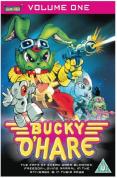 Bucky O Hare - Vol.1 | DVD | (26/02/2007)
from £N/A
| Saving you £N/A (N/A%)
| RRP
Bucky O Hare - Vol.1 | DVD | (26/02/2007)
from £N/A
| Saving you £N/A (N/A%)
| RRP 'Bucky O'Hare And The Toad Wars' started as a comic book about the aforementioned individual and his crew who fought toads in an intergalactic space war. In 1989 it became a TV show and in 1991 Hasbro released a series of 10 figures. Bucky returned to his original medium as a member of the Continuity stable of comics around the same time. He's had a Nintendo game based on him and an Arcade game based on the cartoon (see below) which even used some of the voices from the series. Bucky's original graphic novel was complex and often extremely violent but in spite of this when the 'Teenage Mutant Ninja Turtles' cartoon likewise based on a comic became an unprecedented success Bucky was also adapted for children's Saturday morning cartoons. Marvel and Sunbow commissioned twelve episodes of Bucky O'Hare and The Toad Wars airing them in syndication in 1991. The cartoon introduced the new human character Willy DuWitt. The animated series carried on the complex storylines of the graphic novel but it proved too much for younger viewers...

Please wait. Loading...
This site uses cookies.
More details in our privacy policy